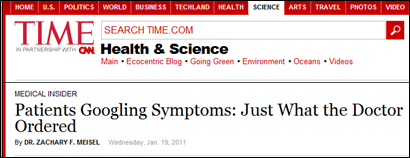Thanks to friends Kavita Patel and Brian Ahier for pointing out this sign of shifting winds, in yesterday’s Time online: Googling Symptoms Helps Patients and Doctors. It’s a watershed moment, because the last physician column I saw on this was the unpleasant 2007 When the Patient is a Googler, by Scott Haig MD.
It drove me up a wall, because the title suggested Googling was the problem, when the story was actually about a nightmare patient who was just plain rude. To brand “googlers” as wack jobs was imprecise at best. I responded with one of my first posts here, March 2008: When the Patient is a Yahoo.
Shortly after, our Alan Greene, physician c0-chair of SPM and co-founder of DrGreene.com, posted here about the article, with links to coverage in Salon.com. He summed up our status:
We live in a time of rapid tectonic shifts in what it means to be a doctor and what it means to be a patient. I’m not surprised that there are clashes of ideology and practice. Our labyrinthine, barnacle-encrusted healthcare system resists change. So do our social structures that have lasted for millennia.
But already many e-patients and many e-doctors are actively enjoying a new way of relating, rooted in mutual respect and open access to health information.
There was so much blog discussion that Dr. Haig led a physician roundtable, How to deal with the digitally empowered patient, reported in Orthopedics Today. Haig cited that twenty major blogs hosted lengthy discussion of his “When the Patient” article. (John Grohol posted here about the roundtable.)
That was the background, from 2008, against which yesterday’s Time piece landed. In the new piece I was thrilled to see author Dr. Zack Meisel (@ZacharyMeisel) describe how patient engagement actually plays out for him: (emphasis added, in all quotes here)
Recently I saw a patient who came to the ER with a strange rash. She arrived with color printouts that correctly identified her condition. Not only was she correct in her self-diagnosis, but I am not sure I would have considered the right diagnosis so quickly if she hadn’t brought in the pictures (it was a common condition with an atypical presentation). I know many health providers who have experienced similar circumstances.
Partnership! An engaged patient, trying to contribute what she can, helps the physician do his job.
The best part comes next:
But to debate whether patients should or should not Google their symptoms (which a surprising number of doctors seem to enjoy engaging in) is an absurd exercise. Patients already are doing it, it is now a fact of normal patient behavior, and it will only increase as Internet technology becomes ever more ubiquitous.
The average Joe has more health information at his fingertips — both credible and charlatan — than all the medical libraries ever built put together. So the real question is, What can professionals do to translate this phenomenon into better health for their patients and the public?
That information-at-the-fingertips point resonates with what a Dartmouth-Hitchcock anesthesiologist told me on a plane flight last May: “I have to take my laptop into the OR. We don’t physically have, here in the building, all the information I might need during the procedures.”
In all of this coverage I think the best perspective is what John G extracted for his post about the roundtable:
A well-educated patient is easier to treat. A badly educated patient is very difficult to treat.
I think it’d be great for the Society for Participatory Medicine to accelerate this shift by developing tools to teach smart info-shopping. Culture change doesn’t show up in life all that often, and we should guide it.
________
A curious note: The headline cited above is different from what it said yesterday:







Thank you so much for sharing this positive link. The amount of discussion that has been given by physicians to the “problem” of having their patients google conditions is ridiculous.
Would any physician NOT look up a condition that they (or a loved one) weren’t expertly familiar with? Of course not.
This point of view is long overdue.
Thanks, Dave, for posting about this article. Thanks also for including the section that links to pewinternet.org’s Health section, which made my day.
I’ll be coming out with a series of reports over the next few weeks to build on what Pew Internet and other researchers have shown: it’s time to stop debating whether people should or shouldn’t go online to gather, share & create health information. Rather, it’s time to acknowledge the strengths and weaknesses of all the resources and paths available to people: professionals, peers; online, offline.
Looking forward to sharing the new data and hearing from everyone about what they think about it!
Back in the days before the internet I actually went back to school and took premed classes to figure out what was wrong with me.
My experience has been doctors abhor an educated patient, even if they got straight As in premed.
My diagnostic accuracy rate is about 85%. Medical science hasn’t even come close. I find this gap very intriguing.
I would love to see a study on how accurate e-patients are with Google derived information.
M
I’m bummed at your experience with docs – there certainly are exceptions to THAT rule. Where are you located?